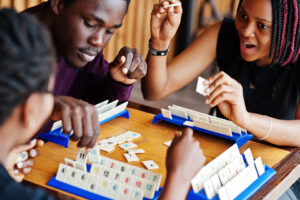As it turns out, the bratty, uncooperative teenager we know from our favorite family films, the one who only wants to hang out with her friends and is utterly “disgusted” by her family’s existence, is based in fact.
According to the World Health Organization, “adolescents experience rapid physical, cognitive and psychosocial growth. This affects how they feel, think, make decisions, and interact with the world around them.”
Adolescent social development is among these changes. You’ve probably noticed that your middle schooler or teenager doesn’t like talking to you as much. We imagine you’ve seen their faces light up when they encounter their friends and their eyes glaze over when interacting with you.
You’re not alone, mom/dad/caretaker. Your teenager still cares about you. They’re just trying to work out how to care about everything else that’s important to them, too.
According to Raising Children, adolescent social changes that can occur within your middle schooler or teenager include:
- Identity: They’re figuring out who they are and how they fit into the world.
- Independence: They want more freedom but are not always equipped to manage it.
- Responsibility: This may look like asking to stay out later, go somewhere with friends, or have more autonomy.
- New Experiences: This could be a new job or extracurricular activity.
- Values: They’re pondering what you’ve taught them and, whether they believe it too, and how it aligns with who they want to be
- Influences: These include familial, cultural, and social forces.
- Sexual Identity: Be prepared for questions and answer without judgment
- Media: How should what they see on social media apply to them? Should it apply? Social media, in particular, is proven to have adverse effects on adolescents.
The Cleveland Clinic says, “socializing online isn’t the same as socializing in person. Adolescents miss out on key facial expressions and body language that they only see when they connect with a person face to face”. Frequent social media use can also lead to depression, anxiety, and low self-esteem because of your child’s deep comparisons between themselves and what they see online.
How adolescent social development impacts your child’s behavior, relationships, and emotional well-being.
Teenagers’ raging hormones often make their behavior susceptible to mood swings, isolation, and limited conversation within the home. As we mentioned earlier, we’re used to seeing this period of life depicted in movies and films. However, there’s more science behind their behavior than you may think.
In an article in the Development of Adolescent Social Cognition from the Natural Library of Medicine, we see that “teenagers are still ‘working out’ social situations due to accumulating experience or developing social skills.” This means your middle schooler or teenager may not have enough social capital to help them assess their emotions and reactions to certain situations. So, instead of a calm conversation detailing what they’ve experienced, you get tears, screams, slammed doors, or an overtly nonchalant attitude.
The emotions that your teenager is experiencing but can’t articulate should be expected. In addition to showing strong feelings about things that happen to them, they’ll also become more sensitive to your emotions, more self-conscious, and go through a bullet-proof phase where they’ll feel invincible to the world’s problems.
Ultimately, the behavioral and emotional changes in your teen will impact your relationship, sometimes in the worst way. In times of high tension between you and your child, it helps to remember that a) you were once a teenager too, b) they’re going through a temporary phase that will pass, and c) as the parent, you control the temperature in the home.
Use open and honest communication about your house rules, listen to their concerns, let them know what’s expected of them, and give them the appropriate space to explore and learn more about who they’re becoming.
Social Development Milestones
As your middle schooler becomes a high schooler, and as your high schooler becomes a young adult, you’ll witness them hit a few timeless milestones, like getting their first job, preparing for their first date, or leaving home for college or joining the workforce.
According to the CDC, between 15 and 17 years of age, most girls will be physically mature by now, and most will have completed puberty. Boys might still be maturing physically during this time. Your teen might have concerns about her body size, shape, or weight. Eating disorders also can be common, especially among girls. During this time, your teen is developing his unique personality and opinions.
Friends are still a priority but by this age they’re more socially and emotionally intelligent then they were in their middle school years. This means their opinions, values, and interactions with you and others are likely more refined.
Strategies to Support Growth
You can support your teen or middle schooler through social growth in several ways.
The CDC suggests encouraging them to volunteer and get involved in their community, show interest in their extracurricular activities, talk to them, help them plan for unfavorable situations, or respect their privacy.
Other ways to offer support include helping them navigate the questions they have about the world, following through on the consequences you’ve set as a parent whenever they go against the rules you’ve established, incorporating more quality time together (even if they resist at first) and decrease screen time to encourage more in-person interaction with others.
For more guidance on parenting middle schoolers and teens, click here.







